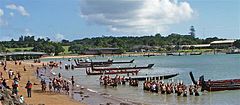| Waitangi Day | |
|---|---|
 Traditional celebrations at Waitangi | |
| Observed by | New Zealanders |
| Type | National |
| Significance | Commemorates the signing of the Treaty of Waitangi, regarded as the nation's founding document |
| Observances |
|
| Date | 6 February |
| Next time | 6 February 2025 |
| Frequency | Annual |
| First time | 1934 |
Waitangi Day (Māori: Te Rā o Waitangi), the national day of New Zealand, marks the anniversary of the initial signing—on 6 February 1840—of the Treaty of Waitangi. The Treaty of Waitangi was an agreement towards British sovereignty by representatives of the Crown and indigenous Māori chiefs, and so is regarded by many as the founding document of the nation.
Waitangi Day was first celebrated in 1934, and it was made a national public holiday in 1974. The anniversary is marked annually on 6 February, and a public holiday is observed on the day, or if the date falls on a Saturday or Sunday then the following Monday is observed.[1]
Ceremonies take place at Waitangi and elsewhere to commemorate the signing of the treaty. A variety of events are held, including parties, Māori hui (social gatherings), reflections on New Zealand history, official awards and citizenship ceremonies. The commemoration has also been the focus of protest by Māori activists, and is occasionally the focus of controversy.
- ^ "Extra public holidays voted in". Newshub. 17 April 2013. Retrieved 6 February 2018.